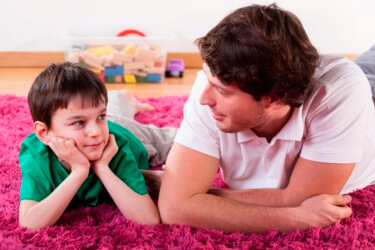 Many of us involuntarily shudder when hearing the phrase “The Sex Talk.” Our minds jump to awkward conversations we had with our parents. This is followed by feelings of guilt because we’ve avoided talking with our own kids about sexuality.
Many of us involuntarily shudder when hearing the phrase “The Sex Talk.” Our minds jump to awkward conversations we had with our parents. This is followed by feelings of guilt because we’ve avoided talking with our own kids about sexuality.
It doesn’t need to be this way. The Sex Talk has a reputation as a one-time, ultra-uncomfortable occurrence that should be over as quickly as possible—similar to ripping off a Band-Aid. But in reality, learning about sexuality is an ongoing and normal part of child development.
Because kids are bombarded with messages about sex at an early age, it’s important to talk with them early and often, and to be honest and judgment-free at all times. Here’s how you can do just that.
When they’re very young, keep it short and sweet.
Children are immensely curious about life. If you have kids under 5 who ask you a question about sex, it’s best to give them a simple and literal response that’s free of slang or euphemisms. Let’s say your 4-year-old asks how babies are born. You might say, “Daddy planted a seed in Mommy’s tummy and you grew inside of her.” Straightforward answers like these typically satisfy young ones’ curious minds.
Don’t wait until they’re teenagers to have the big talk.
By age 9, 10, or 11, kids are on the cusp of puberty—if they haven’t begun it already. There is a chance that their peers have introduced them to pornography. All this exposure is going to fill their minds with questions, and it’s vital that they know they can ask their parents those questions and get honest, free-of-judgment answers in response.
If you choose not to talk about sexuality with your kids, it breeds secrets and shame. But when you choose to talk freely about it, game plans are defined and communication lines stay open.
Do your homework and legwork.
Before you have The Talk with your kids, spend some time thinking about your own values and perspectives when it comes to sex. Your insight will guide the conversation and help shape what your kids ultimately value for themselves.
Finally, explain to them—and remind them—of their rights and responsibilities. Kids have powerful hormones and can make rash decisions, so it’s essential to communicate to them the physical, emotional and relational consequences of sex.

